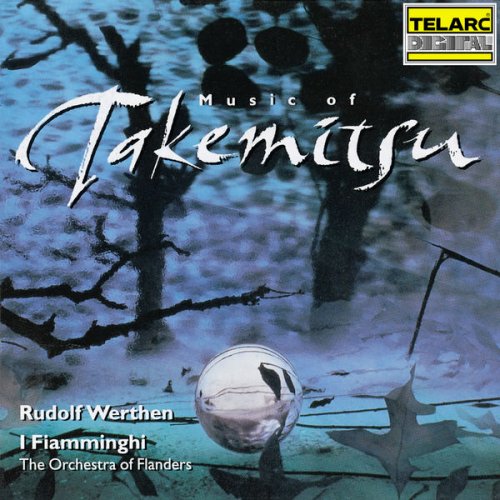
Rudolf Werthen - Music of Takemitsu (2022)
BAND/ARTIST: I Fiamminghi (The Orchestra of Flanders), Rudolf Werthen, Otto Derolez, Joris Van den Hauwe, Frank Hendrickx, Anne-Sophie Bertrand
- Title: Music of Takemitsu
- Year Of Release: 1998 / 2022
- Label: Telarc
- Genre: Classical
- Quality: FLAC (tracks)
- Total Time: 1:06:57
- Total Size: 254 MB
- WebSite: Album Preview
Tracklist:
1. Death and Resurrection (From "Black Rain") (09:59)
2. Funeral Music (From "Black Rain") (04:39)
3. Music of Training and Rest (From "José Torres") (04:24)
4. Rudolf Werthen, I Fiamminghi & Otto Derolez – Nostalghia (12:57)
5. A Way a Lone II (12:55)
6. Rudolf Werthen, I Fiamminghi & Joris Van Den Hauwe – Entre-temps (09:37)
7. Rudolf Werthen, I Fiamminghi, Frank Hendrickx & Anne-Sophie Bertrand – Toward the Sea II: I. The Night (03:45)
8. Rudolf Werthen, I Fiamminghi, Frank Hendrickx & Anne-Sophie Bertrand – Toward the Sea II: II. Moby Dick (04:26)
9. Rudolf Werthen, I Fiamminghi, Frank Hendrickx & Anne-Sophie Bertrand – Toward the Sea II: III. Cape Cod (04:11)
1. Death and Resurrection (From "Black Rain") (09:59)
2. Funeral Music (From "Black Rain") (04:39)
3. Music of Training and Rest (From "José Torres") (04:24)
4. Rudolf Werthen, I Fiamminghi & Otto Derolez – Nostalghia (12:57)
5. A Way a Lone II (12:55)
6. Rudolf Werthen, I Fiamminghi & Joris Van Den Hauwe – Entre-temps (09:37)
7. Rudolf Werthen, I Fiamminghi, Frank Hendrickx & Anne-Sophie Bertrand – Toward the Sea II: I. The Night (03:45)
8. Rudolf Werthen, I Fiamminghi, Frank Hendrickx & Anne-Sophie Bertrand – Toward the Sea II: II. Moby Dick (04:26)
9. Rudolf Werthen, I Fiamminghi, Frank Hendrickx & Anne-Sophie Bertrand – Toward the Sea II: III. Cape Cod (04:11)
Rudolf Werthen, who made his name both as a conductor and as a violin soloist, is established in the Flemish tradition of string playing, and he sees the perpetuation of that tradition as essential to his orchestra’s exploration of the contemporary repertoire. "We specialize in a romantic tradition that runs from Tchaikovsky through Britten and Bartok to the late twentieth-century romantic music of today," he says. "…we aim to draw out from the contemporary repertoire music that is capable of providing emotional depth, and which is consistent with the sound we aim for in the orchestra."
I Fiamminghi’s last release for Telarc was a disc of the music of Vasks (CD-80457). Upcoming will be a recording of the music of Tavener (September, 1998).
"Takemitsu is a master of colors, and much of his music matches the subtlety and character of Japanse painting," says Werthen. "You can hear the breadth of his artistic vision in his music, yet he also connects directly to Western emotions."
Takemitsu was strongly affected by Japan’s involvement and subsequent defeat in World War II, and during his young adult years he immersed himself in music of Europeans, especially Debussy, Messaien, and Schoenberg. He wrote ninety-three scores for films between 1956 and his death forty years later, for some of Japan’s most highly respected directors, including Kurosawa, Teshigahara, and Imamura.
I Fiamminghi’s last release for Telarc was a disc of the music of Vasks (CD-80457). Upcoming will be a recording of the music of Tavener (September, 1998).
"Takemitsu is a master of colors, and much of his music matches the subtlety and character of Japanse painting," says Werthen. "You can hear the breadth of his artistic vision in his music, yet he also connects directly to Western emotions."
Takemitsu was strongly affected by Japan’s involvement and subsequent defeat in World War II, and during his young adult years he immersed himself in music of Europeans, especially Debussy, Messaien, and Schoenberg. He wrote ninety-three scores for films between 1956 and his death forty years later, for some of Japan’s most highly respected directors, including Kurosawa, Teshigahara, and Imamura.
Year 2022 | Classical | FLAC / APE
As a ISRA.CLOUD's PREMIUM member you will have the following benefits:
- Unlimited high speed downloads
- Download directly without waiting time
- Unlimited parallel downloads
- Support for download accelerators
- No advertising
- Resume broken downloads


